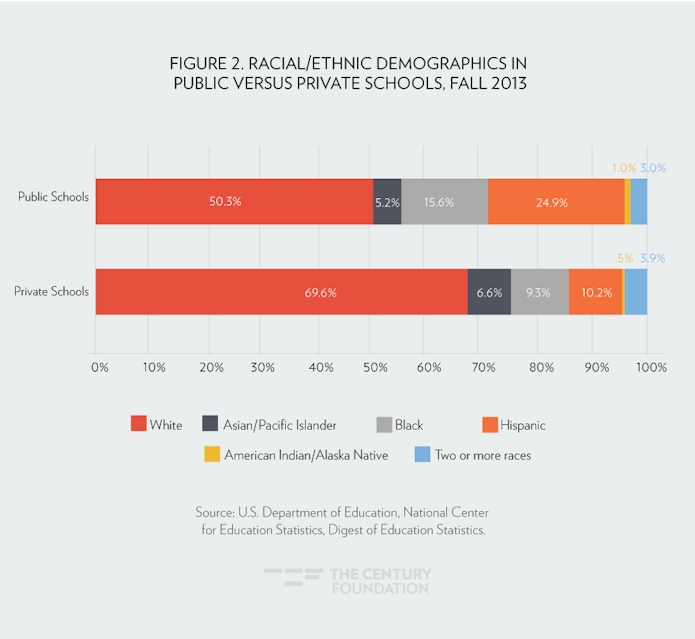Do Private School Vouchers Pose a Threat to Integration?

One of the few ways in which Donald Trump’s presidential campaign addressed the issue of education was through a dramatic promise to create a $20 billion school choice program, including private school vouchers or similar initiatives that fund private school tuition.1 While the political future of the $20 billion proposal is unclear, finding ways to use public dollars to fund private school tuition appears to be a top priority for the administration. U.S. Secretary of Education Betsy DeVos has been an advocate for private school voucher programs throughout her career in philanthropy. And President Trump reinforced his intention to expand school choice in his first address to Congress in March 2017, calling for a bipartisan school choice bill that would enable student to attend a “public, private, charter, magnet, religious or home school.”2
There are multiple reasons to question the value of public programs that provide private school tuition—whether through private school vouchers or similar policies, such as tax credit scholarships and education savings accounts.3 Century Foundation senior fellow Richard D. Kahlenberg outlined some of these concerns in a recent report.4 The academic results of private school voucher programs thus far have been disappointing.5 Vouchers could divert limited funds from public schools, reduce students’ civil rights protections, and erode the separation of church and state. Furthermore, private school vouchers could increase school segregation.
Whether or not private school vouchers promote segregation is to some extent an empirical question, and yet, perhaps not surprisingly, opponents and supporters of private school vouchers tend to disagree on the answer. As part of DeVos’ confirmation process, Ranking Member Patty Murray from Washington State submitted a question asking DeVos whether she would support school choice plans that would increase school segregation. DeVos answered byrejecting the premise of the question: “I do not support programs that would lead to increased segregation. Empirical evidence finds school choice programs lead to more integrated schools than their public school counterparts.”6Examining empirical research is crucial for understanding the implications of different types of school choice on school integration, but DeVos did not actually cite specific evidence in her answer, leaving policymakers and the public without data to evaluate her claim.
This report attempts to fill that gap by examining the evidence available on the effects of private school vouchers on school integration. Contrary to DeVos’ assertion, this report finds that the effects have been mixed, and that voucher programs on balance are more likely to increase school segregation than to decrease it or leave it at status quo. Although the demographics of students and schools create conditions under which vouchers could increase school integration in some places, there is little evidence that this has happened in practice. The best available data on the impact of school vouchers, tracking the movement of students in two different voucher programs, shows that voucher students by and large did not gain access to integrated schools as a result of the programs. Two-thirds of school transfers in one program and 90 percent of transfers in the other program increased segregation in private schools, public schools, or both sectors. Furthermore, data suggest that there is a strong risk that voucher programs will be used by white families to leave more diverse public schools for predominantly white private schools and by religious families to move to parochial private schools, increasing the separation of students by race/ethnicity and religious background.
This report proceeds in five parts. First, it presents a conceptual framework for understanding the conditions under which private school vouchers would promote integration versus segregation. Second, it reviews what descriptive studies on student and school demographics can tell us about the likely effects of private school vouchers on school integration. Third, it analyzes results from two studies that provide longitudinal data tracking the effects of private school vouchers on segregation in the public schools that students leave as well as the private schools that they attend. Fourth, it reviews the results of international studies on voucher programs. Finally, it provides policy recommendations based on these findings.Do Private School Vouchers Pose a Threat to Integration?:
WHAT YOU SHOULD KNOW
- On balance, voucher programs are more likely to increase school segregation than to promote integration or maintain the status quo.
- Although voucher programs that are used by mostly black, Latino, or American Indian students have the potential to increase school integration in some places, there is little evidence that this has happened in practice. The best available data on the impact of school vouchers, tracking the movement of students in two different voucher programs that enrolled mostly black students, shows that voucher students by and large did not see an increase in access to integrated schools as a result of the programs. Two-thirds of school transfers in one program and 90 percent of transfers in the other program increased segregation in private schools, public schools, or both sectors.
- Data suggest that there is a strong risk that voucher programs will be used by white families to leave more diverse public schools for predominantly white private schools, and by religious families to move to parochial private schools. This is particularly likely in programs with universal eligibility or high income caps.
- Large-scale voucher programs in Chile, Sweden, the Netherlands, and New Zealand have by and large been found to increase school segregation.
- If policymakers want to increase school choice and integration at the same time, they should support forms of school choice that have integration built into the design of their program, such as magnet schools and intentionally diverse charter schools.
- Where public programs to fund private school tuition are in place, policymakers should ensure that these programs are designed with safeguards to prevent them from increasing school segregation.Do Private School Vouchers Pose a Threat to Integration?:
